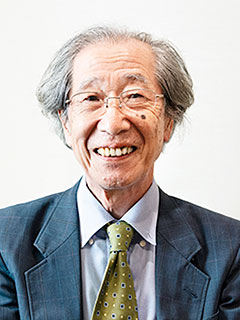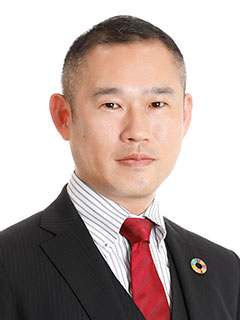Message from Representatives
Messages from The Mathematics Certification Institute of Japan.
Message from the President

Shun-ichi Amari
President of The Mathematics Certification Institute of Japan
Senior Advisor of the RIKEN Brain Science Institute,
Emeritus professor at Tokyo University
Math is fun and even addictive. Don't you all agree? I certainly think so. It has been developed by humanity since ancient times, born and raised in places such as Greece, China, Arabia, and India. Japanese mathematics from the Edo period were of considerably high level as well.
It is a skill born of the brain. At some point in time, the human brain became capable of mathematical thought. It holds the same roots as using language, creating concepts, and examining relationships. Humanity has developed this ability as part of social living. When working together with a partner, the mind needs to communicate, and in order to do that, it must know one's own intentions, while also understanding the intentions of one's partner. The mind, consciousness, language, mathematics, etc. are all products of the same brain.
Mathematics were established and developed by civilized societies as a system of intellect. Thinking mathematically is fun, but there are still many in the world who hate math. Why could that be? Well, topics of study are set every year, and math has become a fixed educational subject, for which students must be tested. Perhaps this is necessary as a social system, but it has watered down the fun of thinking, and requires rote memorization of problem solving strategies, which are nothing more than tricks for quickly answering questions on a test. The brain hates this sort of memorization, but loves to think. There are a lot of misunderstandings about math, such as being only for pure mathematicians who do it for a living, and maybe just a subject that others need to endure for passing tests, or maybe an efficient subject for earning points from time to time. Some famous people have declared that there's no point in teaching solutions to quadratic equations, etc. because we never use that sort of thing in everyday life.
So then, is math just for taking tests? Certainly not. The joy of thinking, using reason to organize matters, deduction, and problem solving are all rooted in human nature. Even those who lean toward the sciences, humanities, or other fields outside of math need to be grounded in mathematics, and it is useful for them to understand that math can be fun. This is a culture created by humanity. Following in the footsteps of Dr. Sin Hitotumatsu and Dr. Jin Akiyama, I was appointed as the third president of this institute. Although it is quite a heavy responsibility to take on, for someone like me who loves math, it is truly an honor to hold such a gratifying position in my later years. My goal is to grow closer to all of you, as kindred spirits who share a love of mathematics.
Message from the Chairman

Shinobu Takada
Chairman of The Mathematics Certification Institute of Japan
Let me ask you a question: What do you think the "60% threshold" means?
That is the long-pursued goal for junior high school students who love mathematics. Specifically, it refers to the percentage of children who answer "Yes" or "I would tend to say yes" to the question: "Do you like studying mathematics?" The question forms part of the National Academic Ability/Learning Situation Survey conducted annually by the Japanese government, and the percentage has never exceeded 60% since the survey started in 2007.
However, an accumulation of diverse efforts made day after day, with a focus on the quality and depth of learning in the classroom, has steadily boosted the ratio, which has reached 58.3% in 2022 and will exceed 60% soon. I would like to express my respect to all those whose hard work has contributed to this outcome.
Another intriguing result of the above survey is the high rates of affirmative answers to the questions: "Do you think studying mathematics is important?" and "Do you think learning mathematics at school will help you in real life in the future?" Amazingly, the level of agreement with those questions remains consistently high year after year. While wondering why children feel that way, I suspect that they somehow sense social conditions and the essence expressed in the educational guidelines through their everyday lives and learning experiences.
As business models focused on solving social issues become popular, Japanese society is moving toward the realization of Society 5.0, a model of society envisioned by the government that is able to solve various social problems by using technology. AI (Artificial Intelligence), big data, and the IoT (Internet of Things) have rapidly progressed to support such initiatives. Accordingly, those advances began to require technically skilled workers in the fields of data science and DX (Digital Transformation), which are indispensable for practical problem-solving activities.
Consequently, securing and developing the skilled workers required by the Society 5.0 vision are paramount. For example, AI Strategy 2022 announced in April 2022, devised to support this concept, contains the section entitled, "Part 4: Constant Efforts to Incorporate AI in Everything," where the government promotes six initiatives. The first initiative is education reform, based on the idea that children need to deeply understand at an early age how various social issues are related to mathematics and science, and thus to experience how they can think and solve problems, empowered by mathematics and science.
The Ministry of Education, Culture, Sports, Science and Technology (MEXT) upholds this idea, referencing their long-held recognition of the social demand for the development of issue-solving skills. MEXT reinforces the theory and envisions a new Japanese education model by citing the ever-more urgent need to develop children's problem-solving abilities in four phases. The four phases comprise detecting issues from current phenomena, thinking independently, engaging in collaborative discussion among members with diverse backgrounds, and finally reaching answers convincing to all. (Excerpts from the Report by the Central Council for Education on "Aiming to build a new-era Japanese education model," held in January 2021)
We hosts diverse mathematics-related projects from the perspective of mathematics as lifelong learning, aiming to assist people's constant growth throughout their lives. For example, the so-called "Suken Test" is our flagship operation, used and tested in various private and institutional educational settings, including schools, cram schools, homeschooling supervised by parents, and social education programs oriented towards self-development of mathematics proficiency. Thanks to the support of applicants and their supporters, the accumulated number of applicants exceeded seven million in March 2022.
I would also like to thank you for your support for our other certification programs, such as "Business Mathematics,” which familiarizes applicants with perspectives and methods on how to use academic mathematics skills in business, and "Mathematics for Data Science Strategist," a certification as a specialist with the fundamental mathematical skills required for data science and consultation skills.
One of our missions lies in providing all generations of people with opportunities to learn mathematics, one of the fundamental skills for solving problems. Fulfilling this goal means satisfying diverse social needs and transcending our conventional fields, namely, certification. While constantly challenging ourselves to explore new possibilities, we will contribute to nurturing capable people through our lifelong mathematics education projects.
In other words, with a sharp focus on public interest, we are determined to restructure our existing activities and create new projects to make our institute even more beneficial to Suken Test examinees and the general public.
Lastly, let me express my gratitude for your kind support and encouragement and ask for your continued patronage.
